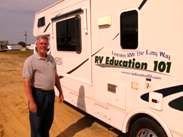I guess because I work in the RV Industry and around RVs almost everyday I take some things for granted. One of those things is RV terminology. When you hear these terms everyday you just assume that everybody understands them. For the new RVer terminology may be a bit confusing. To help clear things up, I’d like to offer some common RV terms that you will encounter during your RVing experiences.
D
Deep Cycle Battery - Often referred to as the auxiliary battery(s) or house battery, it is used to supply 12-volt DC power to the appliances and accessories in the RV. Unlike an automotive starting battery they are designed to hold a charge longer and be discharged repeatedly. The RV battery(s) is charged when the motor home is running, or in the case of a trailer, when the tow vehicle is running, if a charge line was wired in to the trailer plug. It is also charged when the RV is plugged in to a 120-volt power source and by an onboard generator.
Delamination - When the filon, (fiberglass panel) separates from the luan backing used to construct fiberglass sidewalls on an RV. This is usually caused by water damage.
Demand Water Pump - The onboard water system that operates off of a 12-volt demand pump. When you have potable water in your fresh water holding tank and the pump is turned on it pressurizes the onboard water system. When you open a faucet and the water pressure drops the pump cycles on and off to maintain a constant pressure.
Diesel Pusher - A motor home with a rear mounted diesel engine. Often times referred to as a pusher.
Dinghy - A term used for the vehicle you are towing behind the motor home.
Dry Camping - Camping in an RV without any utility hook-ups (water, electric, sewer). You can still use all 12-volt appliances and accessories as long as the deep cycle battery(s) has a charge. You can also use the onboard water system with the 12-volt demand pump and if you have a generator you can use the 120-volt appliances and recharge the auxiliary battery(s). This is what makes an RV fully self-contained.
Dry Weight - Dry Weight (DW) or Unloaded Vehicle Weight (UVW) is the actual weight of the RV as built at the factory. The DW does not include passengers, cargo, fresh water, LP gas, fuel or after market accessories.
DSI- Direct Spark Ignition (DSI) - is a system used to ignite the burner on a propane appliance with the touch of a button. It is commonly used on RV refrigerators, furnaces and on some water heaters.
Ducted A/C and Heat - When the A/C and heat is supplied throughout the RV using a ducting system. A/C is ducted in the ceiling and the heat is ducted in the floor.
Dually - A pickup truck with two tires on each side of the rear axle.
Dump outlet - Where both holding tanks terminate into one main outlet. This is where you connect the RV sewer hose to dump or empty the gray and black water holding tanks.
Dump Station - An area designated and approved for dumping or emptying your gray and black water holding tanks.
E
Electric brakes - Trailer brakes are electric and are activated when the tow vehicle brakes are applied by means of a brake controller installed in the tow vehicle.
Empty Nester - When all of the children are finally out of the house.
Equalizing Hitch - An equalizing hitch, or weight distributing hitch uses additional hardware (spring bars and brackets) to distribute a percentage of the trailer’s tongue weight to the axles on the tow vehicle and the axles on the trailer. Trailer tongue weight should be 10 to 15 percent of the loaded trailer weight.
F
Fifth Wheel Trailer - A trailer with a raised front that extends over the bed of a pickup truck. A special hitch is mounted in the bed of the truck , over the rear axle, to tow a fifth wheel trailer.
Filon - A type of fiberglass sheeting used on RVs with fiberglass sidewall construction.
Fiver - Another term used for a fifth wheel trailer.
Folding Camping Trailer - Also known as a pop-up or tent trailer. They are the smallest of RV’s with collapsible ends and sides for ease of towing and storage.
Fresh Water Fill - An opening on the outside of the RV where you can fill the fresh water holding tank with potable water to use when you are traveling or dry camping.
Fresh Water Holding Tank - A tank mounted under or in the RV that stores potable water for use while traveling or dry camping. To pressurize the system and use the water in the holding tank you turn the 12-volt demand pump on.
Full Hook-Up - A full hook-up means you connect the RV to the campground electric, water and sewer facilities. In addition to this it can also include cable TV and phone line connections.
Full-Timers / Full-Timing - Terms used for RVers that live and travel in their RV full time. Some full timers sell everything and live in their RVs 100% of the time. Other full timers that spend the majority of their time on extended RV trips choose to maintain a house or residence they can return to in between trips.
G
Generator - Commonly used on motor homes a generator produces 120-volt AC power. A generator allows you to use 120-volt appliances when you are not plugged into an external electrical source. Generators are rated in kilowatts. For example a 5 KW generator is 5,000 watts.
Genset - A short term for a generator set.
Gray Water Holding Tank - A tank mounted under the RV that collects wastewater from the sinks and shower. When you dump or empty your holding tanks you should always dump the black tank first, and then dump the gray tank. This will assist in rinsing out the flexible sewer hose.
Gross Axle Weight Rating (GAWR) - Is the maximum allowable weight that an axle is designed to support. The tow vehicle and trailer each have GAWRs.
Gross Combined Weight Rating (GCWR) - The maximum permissible weight of the tow vehicle and trailer combined when both are fully loaded for travel.
Gross Vehicle Weight Rating (GVWR) - is the maximum permissible weight of the vehicle when fully loaded for travel. The tow vehicle and the trailer each have GVWRs.
Gross Vehicle Weight or Gross Trailer Weight (GVW) - This is not a rating; this is the actual weight of the tow vehicle or trailer when they are fully loaded for travel.
This list is not all-inclusive, but if you learn these terms you will soon be understanding RV terminology.
Happy Camping,
Mark
Copyright 2009 by Mark J. Polk owner of RV Education 101
Subscribe to:
Post Comments (Atom)







No comments:
Post a Comment